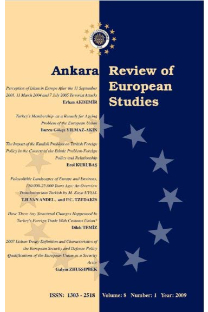Monopolization of Media Ownership as a Challenge to the Turkish Television Broadcasting System and the European Union
Türk yayıncılık sistemi 1990 yıllardan itibaren kayda değer bir gelişim göstermiştir. Ne var ki sistem medya ortamının sağlıklı gelişimini tehdit edecek bir takım sorunları da içinde barındırmaktır. Bu çalışmada çoğulculuğu zedeleyen “medya mülkiyetindeki tekelleşme” olgusu başlıca sorunsal olarak ele alınmıştır. Çalışma bu bağlamda Türk mevzuatındaki gelişmeleri ve Avrupa Birliği’nin yaklaşımlarını irdeleyerek bir durum saptaması yapmayı amaçlamaktadır. Türk Medya Kanunu’nda bu konuda yapılan son değişikliklerin sonuçlarını değerlendirebilmek için de 2004 ila 2010 yıllarının medya mülkiyet yapısı karşılaştırılmaktadır. Avrupa Birliği’nin bu konudaki tutumunu belirlemek aday ülke konumundaki Türkiye’nin gelecekteki medya ortamı ile ilgili olası gelişmeleri tahmin etmemize yardımcı olabilir. Ulaşılan bazı sonuçlar şu şekilde verilebilir: Yeniden düzenlenen Türk Medya Kanunu’nun 2010 yılı itibariyle medyadaki yoğunlaşmayı engellediğini söylemek güçtür. Avrupa Birliği Komisyonu, yoğunlaşmanın neden olabileceği tehlikelerin farkındadır. Ne var ki, yürürlükteki yönergeler bu konuda etkili düzenlemelerin getirilmesini sağlayacak hükümler içermemektedir
Anahtar Kelimeler:
Medyada Yoğunlaşma, Avrupa Birliği, Türk Televizyon Kanalları
MONOPOLIZATION OF MEDIA OWNERSHIP AS A CHALLENGE TO THE TURKISH TELEVISION BROADCASTING SYSTEM AND
Since the 1990’s the television broadcasting system of Turkey has grown with a remarkable impetus. However it has a number of major problems which threaten the development of a healthy media landscape. This paper mainly focuses on the issue of ‘monopolization of media ownership’ which can be detrimental to pluralism. The study which is no more than a status report aims to analyse both the development of Turkish rules against ‘media concentration’, and the European Union’s policy on ‘Media Concentration and Pluralism’. To examine the outcome of the amendments made to the Turkish Media Law, it compared the ownership landscapes of 2004 and 2010. Since Turkey is a candidate state, analysing the European Union’s attitude on media ownership might give us the opportunity to see the possible future developments of the Turkish Media Landscape. Some of the findings are: The amended Turkish Media Law had not prevented media concentration by 2010. The European Union is aware of the danger media concentration might lead to, however, the Directives lack effective media concentration legislation
Keywords:
Media Concentration, European Union, Turkish Television Channels,
___
- Anonim, “Reklam Gelirleri, Akşam Gazetesi, 26th. January 2009.
- Archive of European Integration _____http://www.aei.pitt.edu/983-(June,2009).
- Gülseren ADAKLI, Türkiye’de Medya Endüstrisi: Neoliberalizm Çağında Mülkiyet ve Kontrol İlişikileri, Ankara, Ütopya Yayınevi, 2006.
- Aysel AZİZ, Radyo ve Televizyonla Eğitim, Ankara, Ankara Üniversitesi Eğitim Fakültesi Eğitim Araştırma Merkezi Yayınları, 1982.
- Campaign For Press And Broadcasting Freedom_____htpp://www.culture.gov.uk/PDF/media-own-cpb(May 2010).
- Commission of the European Communities, ‘Pluralism and Media Concentration in the Internal Market’ Green Paper, COM(92)480, Brussels, 23.12.1992.
- Commission of the European Communities, ‘Follow Up to the Consultation Process Relating to the Green Paper on ‘Pluralism and Media Concentration in the Internal Market- an Assessment of the Need for Community Action’.COM(94)353. Brussels,05.01.1994.
- Council Directive 89/552/EEC Official Journal of the European Communities L298 of 3 October 1989.
- Council Directive 97/36/EC Amending Council Directive 89/552/EEC, Official Journal of the European Communities L 202 of 30.07.1997.
- Council Directive 2002/21/EC on a Common Regulatory Framework for Electronic Communications Networks and Services, Official Journal of the European Communities, L 108 OF 24.04.2002.
- Bülent ÇAPLI, “Turkey Television Across Europe: Regulation, Policy and Independence Turkey, Strasburg Society Enstitute, 2005.
- Gillian DOYLE, “Undermining Media Diversity”, Katharine Sarikasis (der.), European Studies: An Interdisciplinary Series in European Culture, History and Politics, Amsterdam, New York, Rodobi B. VC., 2007.
- Eurpean Economic Community Treaty, 25 March 1957.
- European Parliament and Council Directive 2010/13/EU of 10 March 2010.
- European Union_____http://europa.eu.int.
- Alison HARTCOURT, The European Union and the Regulation of MediaMarkets, Manchester, Manchester University Press, 2005.
- Peter HUMPHREYS, Mass Media Policy in Western Europe, Manchester, Manchester University Press, 1996.
- Peter HUMPHREYS, “The EU and The Future of Public Service Broadcasting”, Katharine Sarikasis (der.), European Studies: An Interdisciplinary Series in European Culture, History and Politics, Amsterdam, New York, Rodobi B. V C., 2007.
- Mavise,_____ http://mavise.obs.coe.int/country?id=32, June,2009.
- Medyatava, _____ http://www.medyatava.com/haber.asp?id=62824-(June,2009).
- Cem PEKMAN, “Medya Sahipliğinin Düzenlenmesi Sorunu: Küresel Çerçeve ve Türkiye Örneği”, Mine Gencel Bek ve Deirdre Kevin (der.), Avrupa Birliği ve Türkiye’de İletişim Politikaları: Pazarın Düzenlenmesi, Erişim ve Çeşitlilik, Ankara, Ankara Üniversitesi Basımevi, 2005.
- Ratem Report, _____http://www.ratem.org/2009/RATEM_RDTVSEKTORRAPORU.doc- (June 2009).
- Rekabet Kurumu _____http://www.rekabet.gov.tr/index.php?Sayfa=kararenliste (June 2009).
- Mustafa SÖNMEZ, Meyda, Kültür, Para ve İstanbul İktidarı, İstanbul, Yordam Kitap 2008.
- Nilüfer TİMİSİ, “Medyada Yoğunlaşma ve Şeffaflık Paneli”, 20 Mart 2010, http://www.medyadadergiler.ankara.edu.tr/23/668/8514.pdf> 14 Aralık 2004.
- Mark WHEELER, Supranational Regulation: Television and the European Union, European Journal of Communication, vol.19, no. 3, August 2004.
- ISSN: 1303-2518
- Yayın Aralığı: Yılda 2 Sayı
- Başlangıç: 2001
- Yayıncı: Ankara Üniversitesi Avrupa Toplulukları Araştırma ve Uygulama Merkezi
